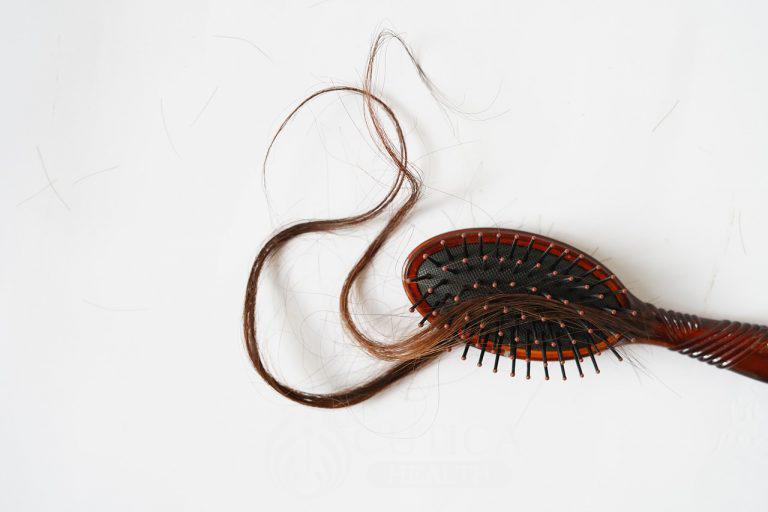
Also, did you know that hair loss in women is as common as it is in men? Yes, it is. While “baldness” is generally seen in men, it is estimated that up to half of women experience some degree of hair loss.
Ngozi’s hair loss was more dramatic than most women experience:
Ngozi, aged 47 years, was in the shower one day when she noticed the nest of hair in the drain. After seeing strands of hair caught between her fingers, Ngozi felt something was amiss. At first, she assured herself that it was caused by excessive shampoo. Weeks later, after losing hair daily, her friends started to comment on the hair loss. Ngozi’s naturally thick curly hair was thinning rapidly, and advice was pouring in about how to restore it. Unknown to her, there was an underlying medical condition.
What causes hair loss in women?

Genetics – Some women are prone to thinning of the hair near the top of the head, known as Female Pattern Hair Loss (FPHL) or Androgenic Alopecia. This type of hair loss gets worse around menopause due to the decline of female hormones (estrogen and progesterone) and relative increase in male hormones (androgens).
Intense physical or emotional stress, plus extreme body changes – Events like surgery, excessive weight loss, and childbirth can cause temporary hair loss. Hair loss can also occur in athletes preparing for major competition.
Medications and therapies – It is common knowledge that hair loss is a side effect of medicines used for cancer. We often forget hair loss may be caused by other medications such as those used for gout, blood pressure, arthritis, and others.
Medical conditions and hormonal changes – Alopecia areata (an autoimmune skin disease) causes patchy hair loss on the scalp. Fungal infection and psoriasis are also known causes. Hormonal changes during pregnancy, childbirth, lactation, and menopause, or thyroid disease may cause hair loss.
Malnutrition – Severe lack of essential amino acids, vitamins, and minerals can result in hair loss.
Hairstyles and hair treatments – Tight ponytails, braids or cornrows pull on the hair follicles. If the hair follicles split, this may result in a form of permanent hair loss known as traction alopecia.
What to do about hair loss

A woman experiencing hair loss should ask herself a few questions: Am I under extreme stress? Does my hairstyle or application have something to do with this? Is there any new medication I am taking? Do women in my family tend to have hair loss?
Sometimes, recognizing and controlling ongoing stress may be all that is needed to control hair loss. Remember that it can take several months for hair to recover. Some women take biotin to promote hair and nail health.
While advice, such as Ngozi got from friends, is well-meaning, do not miss a condition that requires medical treatment. It turns out Ngozi had thyroid problems! Examples of treatment that a doctor can provide, depending on the cause of hair loss, include topical creams or injection, antifungal treatment, replacement of medication causing hair loss, and treatment of thyroid problems.
Go on and enjoy your hair! As the saying goes, “A woman’s hair is her crown and glory.”












